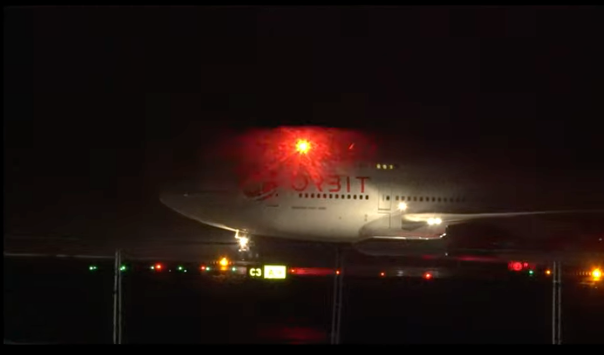Virgin Orbit’s First Launch from the UK Fails to Reach Orbit Due to an Anomaly

Virgin Orbit mission from Cornwall just before takeoff. Screenshot via Virgin Orbit
After announcing that its rocket reached orbit on a historic first mission from the United Kingdom late Monday, Virgin Orbit changed course and said there was an anomaly that prevented the rocket from reaching orbit.
“We appear to have an anomaly that has prevented us from reaching orbit. We are evaluating the information,” Virgin Orbit tweeted at 11:46 p.m. local time on Jan. 9 in Cornwall, in the United Kingdom (6:46 p.m. ET).
The launcher had previously reported the rocket had reached orbit at 11:18 p.m. local time.
It is a high profile failure for Virgin Orbit on what was supposed to be a celebratory and historic mission: the first orbital satellite launch from the U.K., the first commercial orbital launch from western Europe and Virgin Orbit’s first international launch.
In a press release on Thursday, Virgin Orbit said the rocket successfully ignited and made it to space, but “at some point during the firing of the rocket’s second stage engine and with the rocket travelling at a speed of more than 11,000 miles per hour, the system experienced an anomaly, ending the mission prematurely.”
“While we are very proud of the many things that we successfully achieved as part of this mission, we are mindful that we failed to provide our customers with the launch service they deserve,” said Virgin Orbit CEO Dan Hart. “The first-time nature of this mission added layers of complexity that our team professionally managed through; however, in the end a technical failure appears to have prevented us from delivering the final orbit. We will work tirelessly to understand the nature of the failure, make corrective actions, and return to orbit as soon as we have completed a full investigation and mission assurance process.”
The highly anticipated mission was named “Start Me Up” after the Rolling Stones’ 1981 hit, came after years of work and collaboration between Virgin Orbit, and U.S. and U.K. governments. It was was originally targeted for this past summer, and then September, and then pushed to 2023.
“Start Me Up” took off at 10:01 p.m. local time, 5:02 p.m. ET from the newly inaugurated Spaceport Cornwall on England’s southwestern tip. Virgin Orbit uses an air-launch method, in which a modified Boeing 747 airplane, “Cosmic Girl,” takes off from a traditional runway, carrying the LauncherOne rocket which separates mid-flight.
Virgin Orbit confirmed that the Cosmic Girl plane and its crew returned safely back to Spaceport Cornwall.
“Start Me Up” carried satellites for both commercial and governmental customers from a variety of nations including the U.S., U.K., Oman and Poland. The launch was acquired by the National Reconnaissance Office (NRO) from Virgin Orbit National Systems, a Virgin Orbit U.S. subsidiary serving classified customers.
The mission was a collaboration between Virgin Orbit, the NRO, the United Kingdom Space Agency (UKSA), UK Space Command, and Spaceport Cornwall, in addition to other U.K. regulatory authorities. Spaceport Cornwall, for example, received the U.K.’s first-ever spaceport license to host the launch.
As Virgin Orbit’s first launch outside of the U.S., it is part of the company’s plan to take its air-launch capabilities around the world. The company has agreements with South Korea, Australia, Brazil, and Poland to establish operations.
The primary payload was Prometheus-2 — two cubesats owned by the U.K. Ministry of Defense’s Defense Science & Technology Laboratory, designed by Airbus Defence and Space and In-Space Missions to support MOD science and technology.
Rideshare satellites on the mission included IOD-3 Amber, developed by U.K. companies Satellite Applications Catapult and Horizon Technologies and built by AAC Clyde Space for maritime domain awareness.
CIRCE — Coordinated Ionospheric Reconstruction CubeSat Experiment – was a joint mission between the U.K.’s Defense Science and Technology Laboratory and the U.S. Naval Research Laboratory.
Dover was a smallsat pathfinder for global navigation satellite systems, developed by RHEA Group in the U.K. and built by Open Cosmos.
Welsh startup Space Forge is a customer on the mission and its satellite ForgeStar-0 was a fully returnable and reusable platform to enable in-space manufacturing. This was the first launch for Space Forge.
The satellite Aman was Oman’s first orbital mission, an Earth observation satellite built by SatRev to test the feasibility of a larger constellation in the future.
And Stork-6 was the next installment of Polish Small Satellite manufacturer and operator SatRev’s Stork constellation. Virgin Orbit previously launched two spacecraft in this constellation.